| Listing 1 - 10 of 10 |
Sort by
|
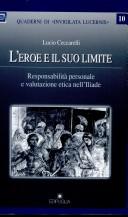
ISBN: 8872282667 9788872282663 Year: 2001 Volume: 10 Publisher: Bari : Edipuglia,
Abstract | Keywords | Export | Availability | Bookmark
 Loading...
Loading...Choose an application
- Reference Manager
- EndNote
- RefWorks (Direct export to RefWorks)
Epic poetry, Greek --- Ethics, Ancient, in literature. --- Heroes in literature. --- Poésie épique grecque --- Morale ancienne dans la littérature --- Héros dans la littérature --- History and criticism. --- Histoire et critique --- Homer. --- Ethics, Ancient, in literature --- Heroes in literature --- History and criticism --- Poésie épique grecque --- Morale ancienne dans la littérature --- Héros dans la littérature --- Epic poetry, Greek - History and criticism
Book
ISBN: 9782841623839 2841623831 Year: 2016 Publisher: Paris : Editions de l'éclat,
Abstract | Keywords | Export | Availability | Bookmark
 Loading...
Loading...Choose an application
- Reference Manager
- EndNote
- RefWorks (Direct export to RefWorks)
Pierre blanche lancée dans le jardin des études classiques, La Fragilité du bien en dépasse largement le cadre pour s’ancrer avec force dans le débat contemporain sur l’action éthique et politique. Qu’en est-il de l’être humain exposé à la fortune (Tuchè) dans la pensée éthique des grands Tragiques (Eschyle, Sophocle, Euripide), de Platon et d’Aristote? Quel rôle tient cette fortune dans la formation de la vertu ou du bon caractère? Quelle relation y a-t-il entre le fait d’être une personne bonne et celui de parvenir à vivre et agir selon le bien? Un livre classique, paru pour la première fois en 1986, « immensément riche et stimulant » (Charles Taylor), qui montre l’extraordinaire actualité de la tragédie et de la philosophie grecques quand il s’agit de penser l’événement moral de notre société contemporaine et qui permet de mieux comprendre l’œuvre d’une philosophe américaine parmi les plus originales de sa génération
Ethics --- Philosophy, Ancient. --- Ethics, Ancient, in literature. --- Fortune in literature. --- Greek drama (Tragedy) --- Morale --- Philosophie ancienne --- Morale ancienne dans la littérature --- Chance dans la littérature --- Tragédie grecque --- History --- History and criticism. --- Histoire --- Histoire et critique --- Plato. --- Aristotle. --- Morale ancienne dans la littérature --- Chance dans la littérature --- Tragédie grecque --- Greece --- Chance in literature --- Plato --- Aristoteles, --- Aristoteles, - 0384-0322 av. J.-C.
Book
ISBN: 2251326545 9782251326542 Year: 2001 Volume: 61 Publisher: Paris Belles Lettres
Abstract | Keywords | Export | Availability | Bookmark
 Loading...
Loading...Choose an application
- Reference Manager
- EndNote
- RefWorks (Direct export to RefWorks)
Elegiac poetry, Latin --- Ethics, Ancient, in literature --- Poetics --- Poésie élégiaque latine --- Morale ancienne dans la littérature --- Poétique --- History and criticism --- History --- Histoire et critique --- Histoire --- Poésie élégiaque latine --- Morale ancienne dans la littérature --- Poétique --- Elegiac poetry, Latin - History and criticism
Book
ISBN: 1283398206 9786613398208 3110211661 3110202492 9783110202496 9783110211665 Year: 2008 Volume: 19 Publisher: Berlin ; New York : Walter de Gruyter,
Abstract | Keywords | Export | Availability | Bookmark
 Loading...
Loading...Choose an application
- Reference Manager
- EndNote
- RefWorks (Direct export to RefWorks)
This volume of collected essays explores the premise that Plutarch's work, notwithstanding its amazing thematic multifariousness, constantly pivots on certain ideological pillars which secure its unity and coherence. So, unlike other similar books which, more or less, concentrate on either the Lives or the Moralia or on some particular aspect(s) of Plutarch's œuvre, the articles of the present volume observe Plutarch at work in both Lives and Moralia, thus bringing forward and illustrating the inner unity of his varied literary production. The subject-matter of the volume is uncommonly wide-ranging and the studies collected here inquire into many important issues of Plutarchean scholarship: the conditions under which Plutarch's writings were separated into two distinct corpora, his methods of work and the various authorial techniques employed, the interplay between Lives and Moralia, Plutarch and politics, Plutarch and philosophy, literary aspects of Plutarch's œuvre, Plutarch on women, Plutarch in his epistemological and socio-historical context. In sum, this book brings Plutarchean scholarship to date by revisiting and discussing older and recent problematization concerning Plutarch, in an attempt to further illuminate his personality and work.
Plutarch -- Criticism and interpretation -- Congresses. --- Plutarch -- Criticism and interpretation. --- Plutarch. Moralia -- Congresses. --- Plutarch. Moralia. --- Greek literature --- Criticism and interpretation --- Plutarch. --- Plutarch --- Ethics, Ancient, in literature --- Philosophy, Ancient --- Morale ancienne dans la littérature --- Congresses. --- Congrès --- Plutarchus --- Plutarkh --- Plutarkhus --- Plutarque --- Plutarco --- Plutarchus, --- Plutarch, --- Ploutarchos --- Blūtārkhūs --- Плутарх --- Плутах --- Plutarh --- פלוטארכוס --- پلوتارخ --- Πλούταρχος, --- Pseudo-Plutarch --- Plutarkhosz --- Balkan literature --- Byzantine literature --- Classical literature --- Classical philology --- Greek philology --- Ploetarchos --- Plutarchus Chaeronensis --- Plutarque (0046?-0120?)
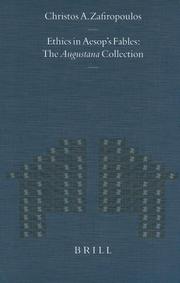
ISBN: 9004118675 9004351043 9789004118676 Year: 2001 Volume: 216 Publisher: Leiden Brill
Abstract | Keywords | Export | Availability | Bookmark
 Loading...
Loading...Choose an application
- Reference Manager
- EndNote
- RefWorks (Direct export to RefWorks)
Ethics in Aesop’s Fables: the Augustana Collection offers an original and innovative analysis of the Greek fable in the framework of Greek ethical thinking. The book starts with a brief account of the history and genre of the Greek fable. It then focuses on the Augustana collection of prose fables and analyses its ethical content in the larger context of Greek thought. A detailed comparison of Greek ethical thinking with the language of the fables shows the persistence of certain types of ethical reasoning and of certain key ethical norms. The author argues that although the fable was not 'philosophy', it was indeed 'philosophical' because it communicated normative messages about human behaviour, which reflected widespread views in Greek ethical thought. This book is of special interest to both students and scholars of Greek fable and of Greek philosophy.
Fables, Greek --- Ethics, Ancient, in literature --- Fables grecques --- Morale ancienne dans la littérature --- History and criticism --- Histoire et critique --- Aesop's fables --- Ethics, Ancient, in literature. --- History and criticism. --- -Greek fables --- Aesop --- -Aesopus --- Ezop --- Esop --- Esopo --- Esope --- Aisōpos --- Esopus --- Ezovbos --- Ezopos --- Īcāp --- Isop --- אזוף --- אזופוס --- איסופוס --- עזאפ --- イソップ --- 伊索 --- Influence --- Influence. --- Aesop's fables. --- -History and criticism --- -Influence --- Morale ancienne dans la littérature --- Aesopus --- Aisōpou mythoi --- Fables of Aesop --- Fabulae Aesopi --- Īcāp kataikaḷ --- Aesop in Mexico --- Μῦθοι (Aesop's fables) --- Mythoi (Aesop's fables) --- Corpus Fabularum Aesopicarum --- Aesopi --- Äsop --- Fables, Greek - History and criticism.
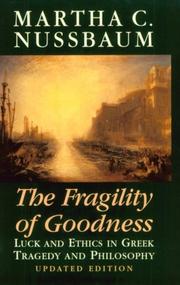
ISBN: 052179126X 0521794722 110738558X 0511817916 9780521791267 9780521794725 Year: 2001 Publisher: Cambridge : Cambridge University Press,
Abstract | Keywords | Export | Availability | Bookmark
 Loading...
Loading...Choose an application
- Reference Manager
- EndNote
- RefWorks (Direct export to RefWorks)
This book is a study of ancient views about 'moral luck'. It examines the fundamental ethical problem that many of the valued constituents of a well-lived life are vulnerable to factors outside a person's control, and asks how this affects our appraisal of persons and their lives. The Greeks made a profound contribution to these questions, yet neither the problems nor the Greek views of them have received the attention they deserve. This book thus recovers a central dimension of Greek thought and addresses major issues in contemporary ethical theory. One of its most original aspects is its interrelated treatment of both literary and philosophical texts. The Fragility of Goodness has proven to be important reading for philosophers and classicists, and its non-technical style makes it accessible to any educated person interested in the difficult problems it tackles. This edition, first published in 2001, features a preface by Martha Nussbaum.
Ethics --- Greek drama (Tragedy) --- Fortune in literature --- Ethics, Ancient, in literature. --- Morale --- Tragédie grecque --- Chance dans la littérature --- Morale ancienne dans la littérature --- History --- History and criticism. --- Histoire --- Histoire et critique --- Plato --- Aristotle --- Plato. --- Ethics, Ancient, in literature --- 17 <09> --- 17 <09> Geschiedenis van de moraal --- Geschiedenis van de moraal --- Deontology --- Ethics, Primitive --- Ethology --- Moral philosophy --- Morality --- Morals --- Philosophy, Moral --- Science, Moral --- Philosophy --- Values --- History and criticism --- Aristotle. --- Arts and Humanities --- Ethics - Greece x History --- Greek drama (Tragedy) - History and criticism --- Fortune in literature. --- History.
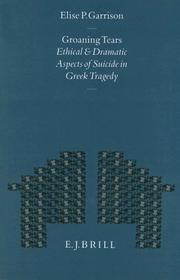
ISBN: 9004102418 9004329528 9789004102415 Year: 1995 Volume: 147 Publisher: Leiden ; New York : Brill,
Abstract | Keywords | Export | Availability | Bookmark
 Loading...
Loading...Choose an application
- Reference Manager
- EndNote
- RefWorks (Direct export to RefWorks)
Groaning Tears examines suicide in Greek tragedy in light of the fifth-century ethical climate. No full-scale work has previously been devoted to this pervasive topic. The particular focus of identifying suicide as a response to the expectations of popular ethics and social demands makes it useful for scholars and students of drama, ethics and sociology. Chapter one establishes the ethical background of audiences in the fifth century while chapters two through five examine suicide in the context of whole plays based on motivational distinctions: to avoid disgrace and preserve an honorable reputation; to avoid further suffering; to end grief; and to sacrifice oneself for a greater good. The final chapter considers a drama of lighter tone that presents suicide in all of its ethical and theatrical aspects.
Thematology --- Classical Greek literature --- General ethics --- Drama --- Antiquity --- Ancient ethics in literature --- Antieke ethiek in de literatuur --- Ethics [Ancient ] in literature --- Ethiek van de Oudheid in literatuur --- Ethique ancienne dans la littérature --- Ethique de l'Antiquité dans la littérature --- Suicide dans la littérature --- Suicide in literature --- Zelfmoord in de literatuur --- Greek drama (Tragedy) --- Suicide --- Ethics, Ancient, in literature --- Tragédie grecque --- Morale ancienne dans la littérature --- History and criticism --- Moral and ethical aspects --- Histoire et critique --- Aspect moral --- Ethics, Ancient, in literature. --- Suicide in literature. --- History and criticism. --- Moral and ethical aspects. --- -Suicide --- -Ethics, Ancient, in literature --- Killing oneself --- Self-killing --- Death --- Right to die --- Causes --- Tragédie grecque --- Morale ancienne dans la littérature --- Suicide dans la littérature --- Greek drama
Book
ISBN: 2130481736 9782130481737 Year: 1997 Publisher: Paris : Presses universitaires de France,
Abstract | Keywords | Export | Availability | Bookmark
 Loading...
Loading...Choose an application
- Reference Manager
- EndNote
- RefWorks (Direct export to RefWorks)
Ethics in literature --- Greek poetry --- Necessity (Philosophy) in literature --- Shame in literature --- Ethics, Ancient, in literature --- Philosophy, Ancient, in literature --- Morale dans la littérature --- Poésie grecque --- Nécessité (Philosophie) dans la littérature --- Honte dans la littérature --- Morale ancienne dans la littérature --- Philosophie ancienne dans la littérature --- History and criticism --- Histoire et critique --- Poesie grecque --- Necessite (Philosophie) dans la litterature --- Philosophie ancienne dans la litterature --- Morale dans la litterature --- Honte dans la litterature --- Responsabilite dans la litterature --- Morale ancienne --- Morale dans la littérature --- Poésie grecque --- Nécessité (Philosophie) dans la littérature --- Honte dans la littérature --- Morale ancienne dans la littérature --- Philosophie ancienne dans la littérature --- Poesie grecque - Histoire et critique
Book
ISBN: 8880965557 Year: 1998 Volume: 27 Publisher: Napoli Loffredo
Abstract | Keywords | Export | Availability | Bookmark
 Loading...
Loading...Choose an application
- Reference Manager
- EndNote
- RefWorks (Direct export to RefWorks)
Speeches, addresses, etc., Latin --- Fathers and sons in literature. --- Ethics, Ancient, in literature. --- Heroes in literature. --- Men in literature. --- Rhetoric, Ancient. --- Oratory, Ancient. --- Discours latins --- Pères et fils dans la littérature --- Morale ancienne dans la littérature --- Héros dans la littérature --- Hommes dans la littérature --- Rhétorique ancienne --- Eloquence antique --- History and criticism. --- Histoire et critique --- Quintilian --- Authorship. --- Declamationes pseudo-Quintilianeae (Maiores) --- Rome --- Historiography. --- Historiographie --- Ethics, Ancient, in literature --- Fathers and sons in literature --- Heroes in literature --- Men in literature --- Oratory, Ancient --- Rhetoric, Ancient --- -Latin orations --- Latin speeches --- Classical languages --- Greek language --- Greek rhetoric --- Latin language --- Latin rhetoric --- History and criticism --- Rhetoric --- -Quintilianus, Marcus Fabius. --- Quinctilian --- Quintilien --- Quintiliano, Marco Fabio --- Kvintilijan --- 昆体良 --- Quintiliano --- Quintillian --- Authorship --- -Historiography --- -History and criticism --- -Authorship --- Pères et fils dans la littérature --- Morale ancienne dans la littérature --- Héros dans la littérature --- Hommes dans la littérature --- Rhétorique ancienne --- Ancient rhetoric --- -Rim --- Roman Empire --- Roman Republic (510-30 B.C.) --- Romi (Empire) --- Historiography --- Quintilianus, Marcus Fabius. --- Declamationes maiores --- Declamationes majores --- Grandes déclamations --- Major declamations --- Quintilianus, Marcus Fabius --- Marcus Fabius Quintilianus --- Quintilianus
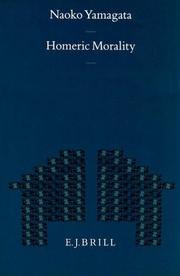
ISBN: 9004098720 9004329366 9789004098725 Year: 1994 Volume: 131 Publisher: Leiden [Netherlands] ; New York : E.J. Brill,
Abstract | Keywords | Export | Availability | Bookmark
 Loading...
Loading...Choose an application
- Reference Manager
- EndNote
- RefWorks (Direct export to RefWorks)
Homeric Morality is an attempt to answer two questions: whether or not the Homeric gods are concerned with 'justice' in human society, and what mechanism controls the social behaviour of Homeric man. It shows that the gods distribute good and bad fortune to men not in response to their moral behaviour, bus as required by fate; men, however, believe that the gods are concerned with human morality, and subsequently their behaviour is restrained by their faith in the moral gods as well as by many other forces, social and emotional. This volume, taken as a whole, serves as a sustained critique of two influential works in the field, The Justice of Zeus by H. Lloyd- Jones and Merit and Responsibility by A.W.H. Adkins.
Poetry --- Classical Greek literature --- General ethics --- Homer --- Epic poetry, Greek --- Ethics, Ancient, in literature --- Moral conditions in literature --- Gods, Greek, in literature --- Poésie épique grecque --- Morale ancienne dans la littérature --- Conditions morales dans la littérature --- Dieux grecs dans la littérature --- History and criticism --- Histoire et critique --- Ethics. --- Greece --- Grèce --- Moral conditions. --- Conditions morales --- Didactic poetry, Greek --- Mythology, Greek, in literature. --- Ethics, Ancient, in literature. --- Moral conditions in literature. --- Gods, Greek, in literature. --- Ethics in literature. --- History and criticism. --- -Ethics, Ancient, in literature --- -Greek didactic poetry --- Greek poetry --- Greek epic poetry --- Epic poetry, Classical --- -Ethics --- -History and criticism --- -Hóiméar --- Hūmīrūs --- Homeros --- Homerus --- Gomer --- Omir --- Omer --- Omero --- Ho-ma --- Homa --- Homérosz --- האמער --- הומירוס --- הומר --- הומרוס --- هومر --- هوميروس --- 荷马 --- Ὅμηρος --- Гамэр --- Hamėr --- Омир --- Homero --- 호메로스 --- Homerosŭ --- Homērs --- Homeras --- Хомер --- ホメーロス --- ホメロス --- Гомер --- Homeri --- Hema --- Pseudo-Homer --- Pseudo Omero --- Ethics --- -Homer --- Homère --- Poésie épique grecque --- Morale ancienne dans la littérature --- Conditions morales dans la littérature --- Dieux grecs dans la littérature --- Grèce --- Ethics in literature --- Mythology, Greek, in literature --- Hóiméar --- al-Yūnān --- Ancient Greece --- Ellada --- Ellas --- Ellēnikē Dēmokratia --- Elliniki Dimokratia --- Grčija --- Grecia --- Gret︠s︡ii︠a︡ --- Griechenland --- Hellada --- Hellas --- Hellenic Republic --- Hellēnikē Dēmokratia --- Kingdom of Greece --- République hellénique --- Royaume de Grèce --- Vasileion tēs Hellados --- Xila --- Yaṿan --- Yūnān --- Ελληνική Δημοκρατία --- Ελλάς --- Ελλάδα --- Греция --- اليونان --- يونان --- 希腊 --- Didactic poetry, Greek. --- Epic poetry, Greek. --- Morals --- Social history --- Social norms --- Greek gods in literature --- Deontology --- Ethics, Primitive --- Ethology --- Moral philosophy --- Morality --- Philosophy, Moral --- Science, Moral --- Philosophy --- Values --- Greek didactic poetry --- Homer. --- Greece. --- Gret͡sii͡ --- Didactic poetry, Greek - History and criticism. --- Epic poetry, Greek - History and criticism.
| Listing 1 - 10 of 10 |
Sort by
|

 Search
Search Feedback
Feedback About
About Help
Help News
News